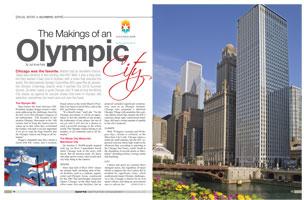
 Chicago was the favorite. Madrid had an excellent chance. Tokyo was certainly in the running. And Rio? Well, it was a long shot, but they wanted it bad. And in October, with a move that shocked the world, the International Olympic Committee (IOC) gave Rio de Janeiro, the Olympic Underdog, exactly what it wanted: the 2016 Summer Games. So what makes a great Olympic city? A look at how the Windy City stacks up against its usurper shows that even in Olympic site selection, sometimes the heart wins out over the head.
Chicago was the favorite. Madrid had an excellent chance. Tokyo was certainly in the running. And Rio? Well, it was a long shot, but they wanted it bad. And in October, with a move that shocked the world, the International Olympic Committee (IOC) gave Rio de Janeiro, the Olympic Underdog, exactly what it wanted: the 2016 Summer Games. So what makes a great Olympic city? A look at how the Windy City stacks up against its usurper shows that even in Olympic site selection, sometimes the heart wins out over the head.
The Olympic Bid
Days before the final selection, IOC President Jacques Rogge issued a statement addressing the challenges faced by the IOC in its first Olympic Congress of the millennium: "The founders of the modern Olympic Movement in the 19th century had to bring the Games and its values up to date when they re-founded the Games. Our task is no less important if we are to reap the huge benefits that the Olympic Games can bring to all humanity."
Rogge's statement may have struck a chord with IOC voters, and it certainly found echoes in the words Brazil's President Luiz Inacio Lula da Silva, said to the IOC just before voting.
"It is Brazil's time," said Lula. "For the Olympic movement, it will be an opportunity to feel the warmth of our people, the exuberance of our culture, the sun of our joy and it will also be a chance to send a powerful message to the whole world: The Olympic Games belong to all peoples, to all continents and to all humanity."
The Windy City Meets the Marvelous City
On October 2, 50,000 people erupted with joy on Rio's Copacabana beach while Chicago took in the news with shock. But all emotion aside, for those who plan sports events, what would each city truly bring to the Games?
Venues More than half of Rio's 2016 venues are already built, including state-of-the-art facilities, such as a stadium, aquatic center and Olympic Arena, constructed for the 2007 Pan and Parapan American Games. Chicago, on the other hand, also offers some first-rate facilities, but its proposal included significant construction, such as an Olympic Stadium. Chicago also proposed a lakefront Olympic Village with amenities like a private athlete beach that, despite the IOC's concerns about tight construction deadlines, did lend a certain amount of sparkle to the city's proposal.
More than half of Rio's 2016 venues are already built, including state-of-the-art facilities, such as a stadium, aquatic center and Olympic Arena, constructed for the 2007 Pan and Parapan American Games. Chicago, on the other hand, also offers some first-rate facilities, but its proposal included significant construction, such as an Olympic Stadium. Chicago also proposed a lakefront Olympic Village with amenities like a private athlete beach that, despite the IOC's concerns about tight construction deadlines, did lend a certain amount of sparkle to the city's proposal.
Climate
With 70-degree evenings and 90-degree days, climate is certainly on the Marvelous City's side. Chicago enjoys a relatively mild summer, but the IOC expressed concerns about high winds in the afternoon that, according to reporting in the Chicago Sun Times, could "result in the disruption of several sports or disciplines" including archery, rowing, tennis and kayaking.
City
Culture and spirit are certainly Rio's strongest assets, but regardless of major efforts to improve the city's safety, Rio is troubled by significant crime, which could present major Olympic challenges. As a city, Chicago is known for its avid sports culture, providing an environment sure to enliven the Games. Chicago's bid also depended heavily on the Windy City's proven strength in medical services, security, technology and media operations.
Accommodations
One of the world's largest, not to mention growing, economies, Rio is a tourist center that hosts one of the largest world events, its annual Carnival. Despite that fact, the city's Olympic bid included necessary plans to double its hotel space prior to the Games. Chicago is certainly equal or superior in this area, with a huge range of centrally located accommodations, and yet its plans also called for accommodations additions.
Transportation
Both cities faced Olympic transportation woes. Many concerns have been expressed in the media about how exactly Olympians will get around Rio, and in fact, part of Brazil's plans include improving Rio's ailing transit system and airport before the Games arrive.
Chicago's transit system was an IOC concern from the start, and the Committee warned that the city's public transportation infrastructure needed major work in order to accommodate Olympic traffic, which the IOC estimated at more than double Chicago's typical rush hour. Chicago's O'Hare International Airport is already the world's second busiest, presenting concerns for IOC voters, along with stringent American security standards, which got negative reviews from some voters after their Illinois site visit.
 Finances/Politics
Finances/Politics
Most sports events have a huge positive economic impact on their host cities, but according to the Canadian Centre for Policy Alternatives' "Cost-Benefit Analysis of the Proposed Vancouver 2010 Winter Olympic and Paralympic Games," the Olympics aren't one of those events. And, according to Rogge's post-vote press conference, the 2016 host city vote wasn't about money either: "It is clear that the IOC in its choice has not chosen, as it has been criticized many times, for the big money. Had we had big money as a consideration then we would have gone with Chicago. That's what it shows. That proves that money is not the driving force in the choice of an Olympic city."
It's true. If there's one thing every commentator agrees on, it's that having the Olympics in Rio will result in lower broadcast contracts and less revenue generation in general. But still, the IOC is putting their money on Rio, in the hopes that the indomitable spirit of the Marvelous City will infuse new life into the Games. In the end, the IOC's decision seems to be about keeping the Olympic torch burning bright, in all places and for all people.

